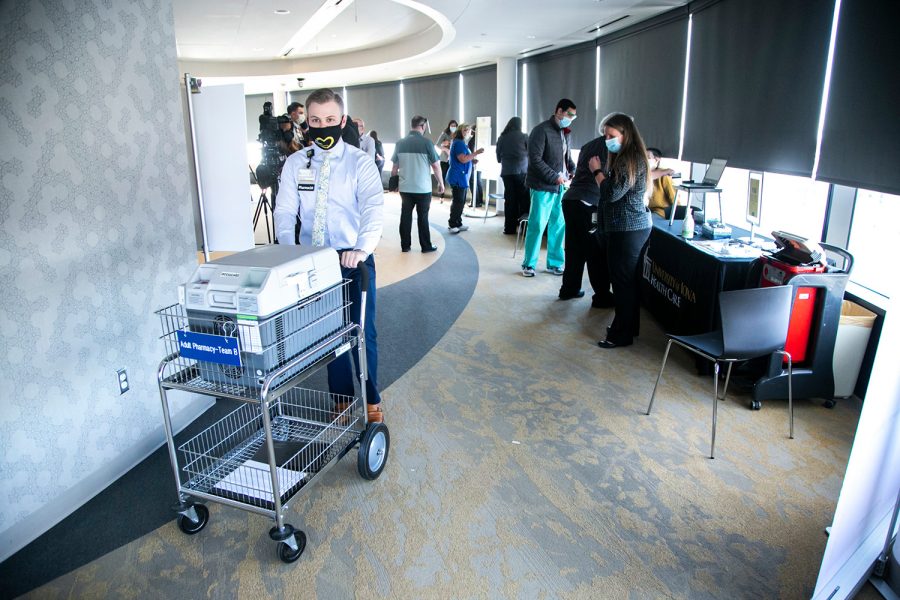Health care workers ‘delighted’ to receive the second dose of the COVID-19 vaccine
After receiving both doses of the COVID-19 vaccine, healthcare workers at the University of Iowa Hospitals and Clinics said getting the shot was worth it despite the side-effects.
Joseph Cress/Iowa City Press-Citizen
Austin M. Cook, a pharmacy supply chain and automation manager at the University of Iowa Hospitals and Clinics (UIHC), wheels a cart as workers at UIHC receive some of first doses of the Pfizer-BioNTech COVID-19 vaccine at the hospital, Monday, Dec. 14, 2020, on the 12th floor of the University of Iowa Stead Family Children’s Hospital in Iowa City, Iowa.
February 11, 2021
Fifty-eight percent of University of Iowa health care employees have received both doses of the COVID-19 vaccine, according to data provided by UI Health Care.
A total of 8,776 health care workers have completed their vaccinations as of Feb. 11, with more being vaccinated each day.
Vaccines became available for UI health care workers in mid-December, with the first shot administered on Dec. 14. Nurse Manager at the University Employee Health Clinic Barbara Schuessler said the vaccination campaign has been modeled after the yearly flu shot campaign.
Employees were sent a survey where they could indicate whether they wanted to get vaccinated through the Employee Health Clinic. Once the surveys were returned, employees could be scheduled for their first dose. After receiving their first shot, health care workers were able to schedule their second dose before leaving the vaccination clinic, Schuessler said.
Grant Schlabaugh, a clinic service specialist with the UI health care, said getting both doses of his Pfizer vaccine was a relatively easy and streamlined process.
“I reported to the main hospital on campus at the time [of my appointment]. They checked me in and gave me my vaccination card,” Schlabaugh said. “I waited in line and then I sat with a nurse who answered my questions and gave me the shot. I waited for 15 minutes which is recommended in case of allergic reactions and then I was good to go.”
While UIHC is not mandating that health care workers receive the COVID-19 vaccine, for employees like UIHC staff nurse Mackenzie Kane, the decision was clear.
“I think it’s important to be vaccinated,” Kane said. “I work with a lot of really, really vulnerable populations. It didn’t dawn on me to not do something that would help protect my patients.”
Kane, who received her second dose of the Moderna vaccine on Jan. 29, reported some side-effects from the shot including headache, arm pain, and fatigue.
“I knew something was coming because my husband is also a nurse and when he got his second shot, it knocked him on his butt for 48 hours,” she said. “I woke up the day after [the second shot] just miserable. My whole body hurt. My head hurt. I was super tired.”
Despite this reaction, Kane said her symptoms had mostly cleared up by the third day after her second dose. She added that she felt it was worth it to get vaccinated and encouraged others to do so if they were eligible.
RELATED: University of Iowa Hospitals and Clinics vaccinate 1,000 people Wednesday
Schlabaugh, who also reported headache and some fatigue following his second shot, said that he wouldn’t be too concerned about the side-effects.
“I would say that there are mild side-effects for sure, but with the majority of the cases that I’ve heard of from friends and coworkers, they have gotten over it within a day or two, so I wouldn’t be too worried,” he said.
Schuessler, who reported doing well after her second dose of the Pfizer vaccine, said she wanted to get the shot so that she could help with herd immunity and protect people who are unable to get the vaccine due to medical conditions.
As the nurse manager for the Employee Health Clinic, Schuessler said she was also a part of setting up the vaccination clinic at UIHC. As more and more employees get their second dose, she said she’s been surprised by the joy she’s seen from healthcare workers.
“I’ve had so many people come in and want selfies. They’re taking pictures,” she said. There’s one group of physicians who are all taking pictures of them getting their shots because they were going to put a collage together for their group. I’ve had a couple of people come in with the programs from their mothers’ funerals after their mothers passed away from COVID-19 and they wanted to share that this is why they were getting the vaccine. I have written the words ‘for mom’ on a band-aid and taken a picture so that she could share it with her siblings. People are just delighted to be getting the vaccine. Sometimes they’re so happy they’re shaking or a little teary about it. It has been a wonderful, wonderful experience to be a part of.”





